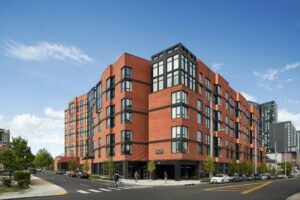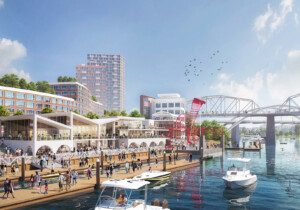Nashville’s Mayor Megan Barry has announced the ballot language for the city’s much-anticipated transit referendum. The referendum, which will be voted on in a May 1, 2018 election, would bring a completely new expansive light-rail system to the city. At a cost of $5.2 billion, it would be one of the most ambitious transit plans in the United States, and the largest single project Nashville has ever taken on.
The announcement included the full 205-word ballot measure, a broad overview of the proposed referendum. Those projects would “improve and expand its transit services to include: expanded bus service countywide; new transit lines; new light rail and/or rapid bus service along Nashville’s major corridors, including the Northwest Corridor and a connection through downtown Nashville; new neighborhood transit centers; improvements to the Music City Star train service; safety improvements, including sidewalks and pedestrian connections; and system modernization.”
The wording also outlines the city’s plan to raise four taxes, in the form of surcharges, to fund the projects. These include, “a sales tax surcharge of 0.5 percent for the first five years, increasing to 1 percent in 2023; a hotel/motel tax surcharge of 0.25 percent for the first five years, increasing to 0.375 in 2023; a 20 percent surcharge on the business/excise tax; and a 20 percent surcharge on the rental car tax.” The next step for the referendum will be gaining the approval from the Metro Council for the ballot language.
The plan includes 26 miles of new light rail, additional bus services, and most dramatically, a rail tunnel that will stretch under the downtown 40 to 50 feet below the street level. The 1.8-mile-long, 60-foot-wide tunnel would contain two tracks, and would cost an estimated $900 million. Above ground, five light rail corridors will run to the downtown from all directions in the city.
While the rail portion of the project would take until 2032 to complete, the improvements to other parts of the system could be implemented much quicker. In particular, 25 miles of rapid bus transit and “neighborhood transit centers” would connect the bus system to the future rail network.
Another aspect of the proposal is reduced or free transit fares for residents living below the federal poverty line. This consideration would help offset the increased sales tax burden on the poor, who are often disproportionately affected by such taxes.
If Nashville residents approve the referendum, the city will join the likes of Seattle, Los Angeles, and Atlanta, who have all recently passed extensive transit plans. Critics of these types of plans question the return on investment of the billions of dollars, while proponents argue that they are needed to attract the types of companies and workers 21st-century cities need. An example often cited is the call from proposals for the Amazon HQ2. Amazon specifically requested a robust mass transit system for its workers, a requirement that many midsize cities are unable to meet.










